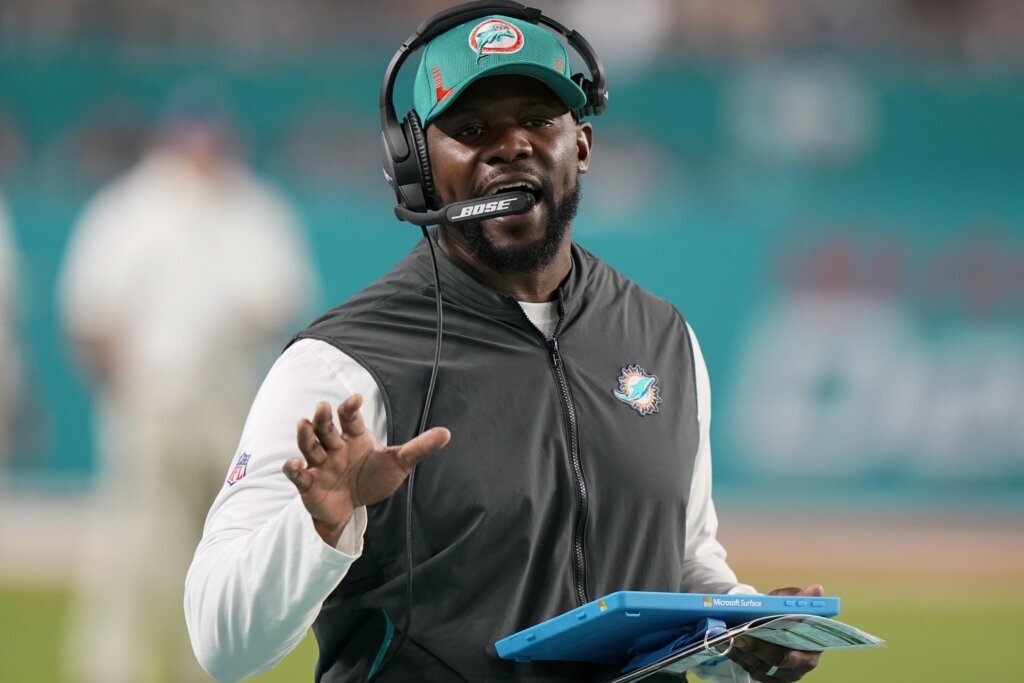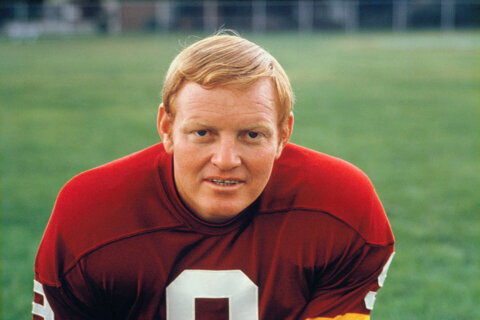
Brian Flores vs. the NFL. Unfortunately, this is where it was always going to end up.
Given the sheer volume of columns I’ve written on racial inequity among NFL coaches, I’m not sure how this never made its way into this space — but I’ve always held the belief that the only way to inspire change is if someone is willing to stand up and be the Colin Kaepernick of coaches. Flores is apparently that martyr.
Flores made the media rounds Wednesday morning, a day after filing a class action suit against the NFL and three teams, including the Miami Dolphins franchise that employed him, allegedly asked him to compromise the integrity of the game and commit tampering.
A bombshell lawsuit accuses the NFL of racism in hiring coaches — and now the former coach who filed it is speaking out for the first time on #CBSMornings.
Brian Flores says, “It’s hard to speak out…but this is bigger than football. This is bigger than coaching.” pic.twitter.com/hI92p8rvEd
— CBS Mornings (@CBSMornings) February 2, 2022
I believe every word Flores spoke and every letter of the 58-page suit. Here’s at least two reasons why. First of all, read this scathing statement from the league:
NFL statement on Brian Flores’ lawsuit: pic.twitter.com/6hLJXTLmsO
— Ari Meirov (@MySportsUpdate) February 1, 2022
Why did the league take that tone? Why didn’t the NFL, as most corporations do in similar situations, serve up the perfunctory “We’re troubled by these allegations and will thoroughly investigate?”
Here’s why: Nobody pushes back on being called a racist more than a racist. Instead of hearing the literal cries for equality from Black coaches, the NFL and its owners would rather pour millions of dollars into litigation.
Secondly, it feels like I’ve written about this a million times: A disturbing trend in the NFL’s hiring. The double standard regarding Eric Bieniemy. The flaw in owners’ never-ending quest for Sean McVay 2.0. The hoops Black coaches have to jump through just to get a whiff of a chance.
How last year’s Super Bowl should have changed things for the better but has not. The only thing that has changed is the names attached — and in the case of Bieniemy, the above column is just as true today as it was when I wrote it.
Hell, Flores is still (as of this writing) in the running for the coaching vacancy in Houston, where the Texans job came available after that trainwreck franchise hired a longstanding and respected Black coach only to pull the rug out from under him after one miserable season in which he never had a real chance to succeed. It was a setup so egregious, Flores actually names David Culley in the lawsuit.
And you know what? The NFL and its owners don’t give a damn — couldn’t care less. Look at what they do, not what they say.
It took a Minneapolis police officer kneeling on a man’s neck for more than eight minutes and a Super Bowl quarterback getting blackballed to force the NFL into even performative action, such as etching “End Racism” all over stadiums and helmets while proudly trotting white coaches onto virtually every sideline to lead rosters that are average 70% Black.
This Brian Flores lawsuit against the #NFL is going to resonate throughout sports and be a significant moment in the history of the league. I’ve spoken to two other coaches who believe they have the receipts to be a part of the class. This could be a tsunami before it’s all over.
— Charles Robinson (@CharlesRobinson) February 1, 2022
Brian Flores was the most accomplished & experienced NFL coaching candidate in this hiring cycle. He was coming off consecutive winning seasons, a seemingly unjust firing & here come the Giants, viewing him as a Rooney rule quota-filler to check off. He has a right to be hostile.
— Michael Lee (@MrMichaelLee) February 2, 2022
The New York Giants, who along with the Dolphins and Denver Broncos were specifically named in the lawsuit, released a laughable statement refuting what’s crystal clear. How can a team — especially one that has never had a Black head coach and was the last NFL team to start a Black QB in 2017 — say with a straight face “we hired the individual we felt was most qualified to be our next head coach,” when they had already settled on a first-time head coach with ties to the new general manager over Flores, who has already proven he can turn around a moribund NFL franchise like the Giants have been in recent years?
Texts from Bill Belichick to Brian Flores, congratulating Brian for landing the #Giants job.
Belichick thought he was texting Brian Daboll. He was texting Flores by mistake. pic.twitter.com/Y686XcjYC3
— Dov Kleiman (@NFL_DovKleiman) February 1, 2022
Get out of my face with any criticism of Flores. He led the dysfunctional Dolphins — and I’m talking Snyder-like dysfunction if these allegations against Dolphins owner Stephen Ross are true — to consecutive winning seasons for the first time since 2003, which just so happens to be the year the Rooney Rule was instituted.
As much as the Rooney Rule has evolved in the nearly two decades since its inception, it’s been largely toothless. Look at the fate of Black coaches since 2000: It’s painfully obvious they get fewer opportunities, and when they do finally get their shot, they get far less benefit of the doubt than their white counterparts.
“The Rooney Rule is intended to give minorities an opportunity to sit down in front of ownership,” Flores said Wednesday on “CBS Mornings.” “But I think what it’s turned into is … where guys are just checking a box. And that’s been the case. I’ve been on some interviews in the past where I’ve had that feeling. There’s always no way to know for sure. But you know.”
As is the case with virtually every profession, the only way for true diversity to take root is diversity in leadership — and, in the case of the NFL, that means ownership. As of now, there is one non-white NFL owner, Shad Khan in Jacksonville, and he’s demonstrated he’s falling right in line with his white counterparts.
Flores, 40, filed this suit knowing full well it could cost him his career in its prime. This wasn’t 65-year-old Culley who stepped forward — it’s a man with at least 10 to 15 years left in the tank if he wants to continue coaching.
“I’m hopeful that I will,” Flores said on ESPN’s “Get Up” when asked whether he thinks he’ll coach in the NFL again. “I understand the risks of filing a lawsuit like this … but if change comes and if I never coach again and there’s change, it’ll be worth it.”
Change starts at the top. The NFL has a path to creating more minority representation at the ownership level. The Denver Broncos are currently for sale, and backing Robert F. Smith’s bid would be a start.
Properly investigating and then purging the league of Stephen Ross and Dan Snyder, followed immediately by a more inclusive purchasing process in Miami and Washington, respectively, would be a true sign the league finally “gets it” and not just throwing money at empty platitudes about how much it (allegedly) cares.
But these are billionaires we’re talking about. The only way to get them to move is to adversely affect their money. We saw it with Washington’s name change, and the NFL’s sponsors can choose to make another power play.
Diversity universally makes for a better product. And if framing it as “it’s good for business” does the trick, so be it.
However it gets done, the NFL is long overdue to make it happen. Not just for Flores, Culley and the next generation of Black coaches passionate about the game. For all of us.








